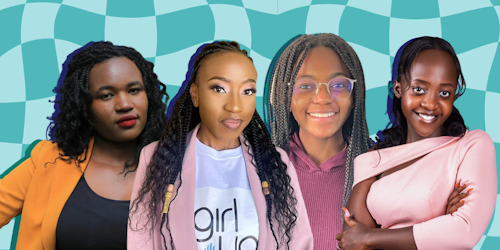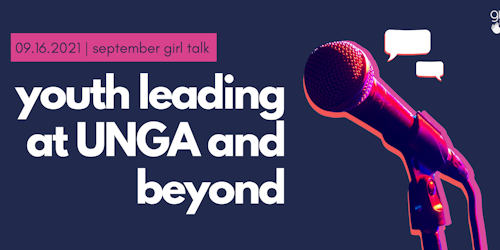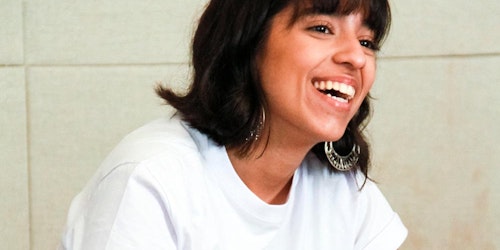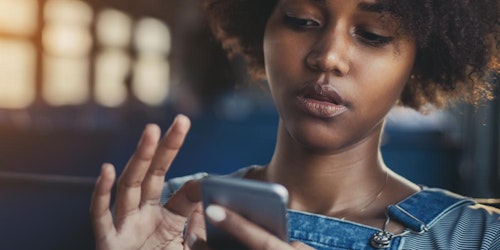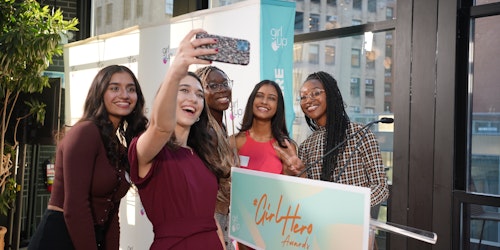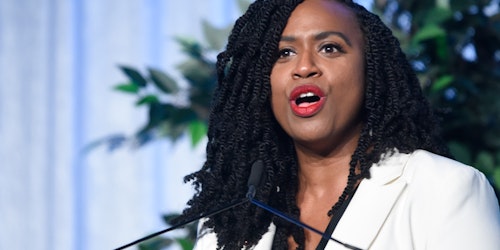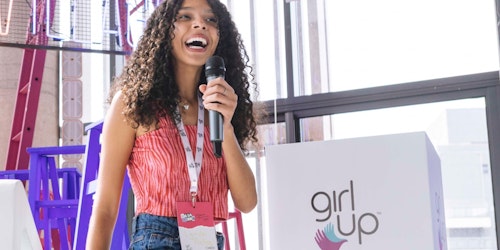TW: Mentions of violence against youth, sexual violence
Estimated reading time: 4 minutes
There is a boldness in the act of speaking, when there is so much silence today. Stigma prevents many people from speaking about their experiences with violence, and international conflicts and globalization can create a cacophony, making the voices of youth sound quiet in comparison. Youth know this well, and work every day to overcome it. Working with Girl Up to launch gender justice initiatives and leading a working group advocating for a DC Youth Climate Advisory Council, I have seen this firsthand. Recently, I gave the closing address at a Together for Girls event called “Every Child Safe.” Dedicated to ending violence against children—especially sexual violence against girls—the event did something essential: It prioritized the voices of those who were impacted by violence, and those of girls and youth themselves. Giving those that are disproportionately impacted by violence space to speak allows these people to spread awareness about their lived experiences and work to make sure these experiences do not happen again, allowing those who might otherwise be silenced to instead educate others. Having a dialogue about violence towards youth is necessary, and this dialogue must include the youth themselves.

Having a dialogue about violence towards youth is necessary, and this dialogue must include the youth themselves.
Here are three things I learned from speaking at Together for Girls’ “Every Child Safe” event:
People are powerful.
Activists from throughout history have sought to take the first steps to change. It was individuals who first identified the need for child abuse and neglect laws, mandatory reporting requirements—and took the years to fight for them. But collaboration—linking together changemakers to spearhead change—is what makes this fight lasting. Speakers at this event ranged from Gloria Estefan and Elizabeth Cousens to Daniela Ligiero to others deeply experienced and passionate about these issues, each with their own perspective. Putting all of these activist voices in the room at once and allowing us to speak, plan, and form networks together created a harmony that demanded to be heard.
In my remarks, I told a story from around this time last year, when I was working as a peer educator and received a message from someone whose younger sister had been sexually assaulted at school, and whose school did not act to solve the problem even after I contacted them. When children’s voices are taken from them, it can be difficult to speak up in the first place– and when we do, we are too often met with no response. But hearing all the inspiring speakers at this event underscored the fact that children and adults alike can take the power to reclaim their voices. Simply speaking and elevating the voices of advocates and survivors can cause change, resisting the silence that enables violence.
Humor can be a tool for good.
Since I write for a humor magazine, I feel that it is always important to find time to giggle nefariously. Dialoguing and advocating, while vital, can be tense and discouraging work. These are issues that require action to address, and this action often requires plowing through administrative hurdles and naysayers to achieve justice. I am a firm believer that humor can alleviate some of this advocacy fatigue, helping us zoom out and recognize the importance of the work we do. That’s why I worked a Homer Simpson quote in towards the end of my remarks—and luckily, people actually laughed. This encouraged me to include more Homer in my speeches going forward, but also taught me that finding time for joy, however temporarily, is an essential part of advocacy. However difficult and inherently serious the work is, the happiness that comes with improving the lives of our communities exists in equal measure.
There is a Ministerial conference coming up in November.
I also learned that there is another opportunity to center the voices of children, girls, and survivors on the horizon: The conference in November. Youth, girls, and survivors are the experts in our own experiences, and we want to be part of the change required to prevent and end violence. Understanding that we are paving the way for not just the youth of today to act, but also for the youth of tomorrow to thrive, is key. This conference will include those most affected, and allow us to speak with experience and empathy, humor and seriousness, and, most importantly, loud enough for our voices to be heard.
About Elsa B.
Elsa (she/her) is a high school junior from Washington, DC passionate about exploring the connections between gender equality and environmental justice. She is a Girl Up Mid-Atlantic coalition leader and is currently working to create a DC Youth Climate Council.
Elsa has been heavily involved in sexual health advocacy, co-authoring a published paper on expanding access to PrEP medication for cis and trans women and working on the DC Youth Advisory Council for Health. As part of her activism, Elsa has testified at DC City Council hearings, spoken at a NOAA event for young changemakers, and led support efforts for local women’s shelters. She cares deeply about counteracting the sexual and gender based violence targeted towards girls every day.

